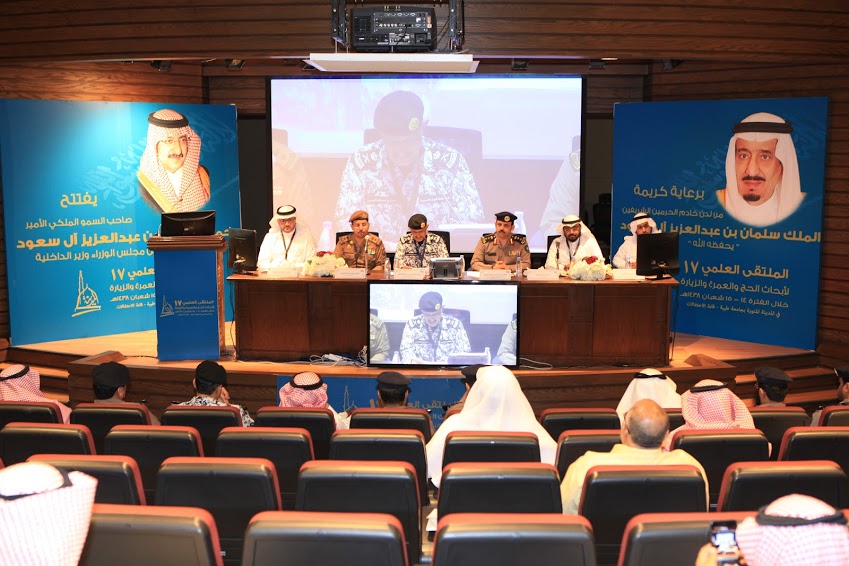
At the beginning of the second day of the 17th Hajj and Umrah Researches Scientific Meeting organized by Umm Al-Qura University (UQU) (represented in the Madinah branch of the Custodian of the Two Holy Mosques Institute for Hajj and Umrah Research) and held these days at Taibah University, the participants discussed the work sheets presented in its fifth scientific session. Discussions at the session, which was headed by Maj. Gen. Saad bin Abdullah Al-Khaleewy, Director General of King Fahd Security College (KFSC), and titled, “Initiatives and Achievements in the Development of Services and Facilities,” concluded to a number of recommendations. During the session, Muhammad bin Abdul-Rahman Bijawi, Undersecretary of the Ministry of Hajj for Visit Affairs, presented a work sheet titled, “The Trip of the Undersecretairat of the Ministry of Hajj And Umrah For Visit Affairs with Quality and Institutional Excellence to Serve Pilgrims.” Mr. Bijawi demonstrated the exerted efforts for the service of pilgrims, and the application of quality and institutional excellence standards in the planning, implementation, supervision and follow-up of the provided services’ system. He also reviewed the plans and programs fulfilled by the Undersecretairat within its strategic objectives, as well as the standardized documentation of work procedures, performance indicators (which contributed to raising institutional efficiency) and the operational objectives and initiatives in the plan, 82% of which was fulfilled.
On the other hand, Mu’adh Abdullah Ateeq Al-Harbi, Awad al-Haisouni, Thamer Muhammad Al-Harbi and Abdul-Aziz Awad Al-Harbi, the researchers at the Agency of the General Presidency for the Holy Mosque and the Prophet's Mosque, presented a scientific paper titled, “Project of the Custodian of the Two Holy Mosques for Simultaneous Interpretation." The researchers presented the effective role of the simultaneous interpretation of speeches and scientific lessons at the Holy Mosque and the Prophet's Mosque into seven languages, as well as the translation of scientific brochures and pamphlets, and the contents on the electronic screens and the media banners into the seven approved languages (English - French - Urdu - Indonesian - Persian - Turkish - Hausa). They noted that such pilot project had witnessed a continuous development during the past years since its launch in 1435H.
Within the discussions, Dr. Khaled bin Muraished Al Otaibi (Colonel at the General Directorate of Safety, the General Directorate of Civil Defense in Medina) participated with a scientific paper titled, “The Effectiveness of Preventive Planning for Civil Defense Works in Medina and Hajj." He explained that preventive planning was commensurate with the works of fire service, rescue, ambulance, and safety, noting the existence of some constraints, and the need for more support for preventive education efforts.
Dr. Al Otaibi also referred to the recommendation to activate the role of engineering, advisory and technical offices for fire protection and prevention according to the tasks entrusted to them to achieve a higher level of safety, activate statistical units at the departments concerned with planning, and conduct more studies, analysis and preventive planning on the causes of accidents. He called for a reconsideration of the mechanism of volunteerism and the unification and organization of efforts. This would be through forming specialized teams under the supervision of the Civil Defense, raising the efficiency of those involved in planning and enrolling them in advanced courses, coordinating with the Ministry of Hajj and Umrah, and developing a strategic plan in the domain of preventive awareness of pilgrims in coordination with Hajj missions.
Then, the researcher Mushabbeb Abdullah Al Rumman from the Public Security participated with a scientific paper titled, “The Role of the Special Force for the Security of the Sacred Mosque in the Service of Pilgrims.” He highlighted the efforts of the Special Force to provide security and tranquility to the pilgrims at all times, indicating his reliance on three themes: security, organization and humanitarianism. Moreover, he pointed out that the special force received integrated human, material and technical support through the provision of qualified human cadres with skills and experience to organize the movement of worshipers to and from the Sacred Mosque easily and smoothly.
Finally, Dr. Ammar bin Abdullah Attar (from the College of Applied Medical Sciences at UQU and Supervisor of the Institutional Transformation Directorate "Haramain Project" at the General Presidency for the Holy Mosque and the Prophet's Mosque) participated with a work sheet titled, “Strategic Development of the Roles Played by the General Presidency for the Holy Mosque and the Prophet's Mosque.” He shed light on the preparation by "Haramain Project" of a long-term strategic plan for the presidency of the Two Holy Mosques for ten years from 1437 to 1446H. He pointed out that the project also aimed to develop a phased implementation plan for its first five years, including programs and practical initiatives, emanating from and achieving the objectives of the long-term plan. He added that the project aimed at the establishment of mechanisms for follow-up and periodic review.